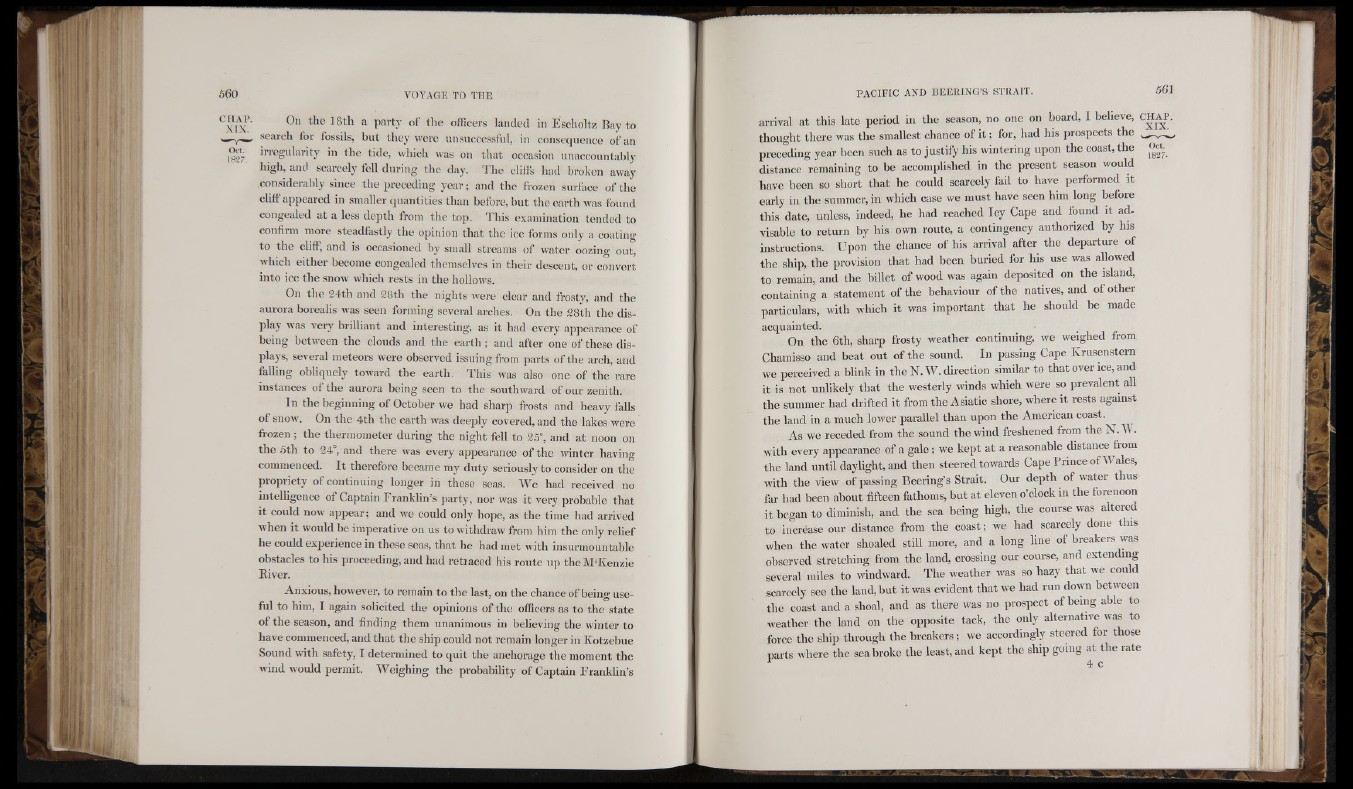
I f ) ,
On the 18th a party of the officers landed in Escholtz Bay to
search for fossils, hut they were unsuccessful, in conscipiencc of an
irregularity in the tide, ivhich was on that occasion unaccountably
high, and scarcely fell during the day. The cliffs had broken away
considerably since the preceding year; and the frozen surface of the
clitf appeared in smaller quantities than before, hut the earth was found
congealed at a less depth from the top. This examination tended to
confirm more steadfastly the opinion that the ice forms only a coating
to the cliff, and is occasioned by small streams of water oozing out,
which either become congealed themselves in their descent, or convert
into ice the snow ivhich rests in the hollows.
On the 24th and 28th the nights were clear and frosty, and the
aurora borealis was seen forming several arches. On tlie 28th the display
was very brilliant and interesting, as it had every appearance of
being between the clouds and the earth ; and after one of these displays,
several meteors were observed issuing from parts ofthe arch, and
falling obliquely toward the earth. This was also one of the rare
instances of the aurora being seen to the southward of our zenith.
In the beginning of October we had sharp frosts and heavy falls
of snow. On the 4th the earth was deejily covered, and the lakes were
frozen ; the thermometer during the night fell to 25", and at noon on
the Sth to 24°, and there was every appearance of the winter having
commenced. It therefore became my duty seriously to consider on the
propriety of continuing longer in these seas. We had received no
intelligence of Captain Franklin’s party, nor was it very probable that
it could now appear; and we could only hope, as the time had arrived
when it would be imperative on us to withdraw from him the only relief
he could experience in these seas, that he had met with insurmountable
obstacles to his proceeding, and had retraced his route up theMTienzie
Eiver.
Anxious, however, to remain to the last, on the chance ofbeing useful
to him, I again solicited the opinions of the officers as to the state
of the season, and finding them unanimous in believing the winter to
have commenced, and that the ship could not remain longer in Kotzebue
Sound with safety, I determined to quit the anchorage the moment the
wind would permit. Weighing the probability of Captain Franklin’s
arrival at this late period in the season, no one on board, I believe,
thought there was the smallest chance o f it; for, had his prospects the — ,
preceding year been such as to justify his wintering upon the coast, the
Oct.
1827-
distance remaining to be accomplished in the present season would
have been so short that he could scarcely fail to have performed it
early iu the summer, in which case we must have seen him long before
this date, unless, indeed, he had reached Icy Cape and found it advisable
to return hy his own route, a contingency authorized by his
instructions. Upon the chance of his arrival after the departure of
the ship, the provision that had been buried for his use was allowed
to remain, and the billet of wood was again deposited on the island,
containing a statement o fth e behaviour ofth e natives, and of other
particulars, with which it was important that he should be made
acquainted.
On the 6th, sharp frosty weather continuing, we weighed from
Chamisso and beat out ofth e sound. In passing Cape Krusenstern
we perceived a blink in the N. W, direction similar to that over ice, and
it is not unlikely that the westerly winds which were so prevalent all
the summer had drifted it from the Asiatic shore, ivhere it rests against
the land in a much lower parallel than upon the American coast. ^
As we receded from the sound the wind freshened from the N .M .
with every appearance of a g a le ; we kept at a reasonable distance from
the land until daylight, and then steered towards C a p e Prince of AVales,
with the view of passing Beering’s Strait. Our depth of water thus
far had been about fifteen fathoms, but at eleven o’clock in the forenoon
it began to diminish, and the sea being high, the course was altered
to increase our distance from the coast; we had scarcely done this
when the water shoaled still more, and a long line of breakers was
observed stretching from the land, crossing our course, and extending
several miles to windward. The weather was so hazy that we could
scarcely see the land,but itwas evident thatwe had run down between
the coast and a shoal, and as there was no prospect of being able to
weather the land on the opposite tack, the only alternative was to
force the ship through the breakers; we accordingly steered for those
parts where the sea broke the least, and kept the ship going at the rate
^ 4 c